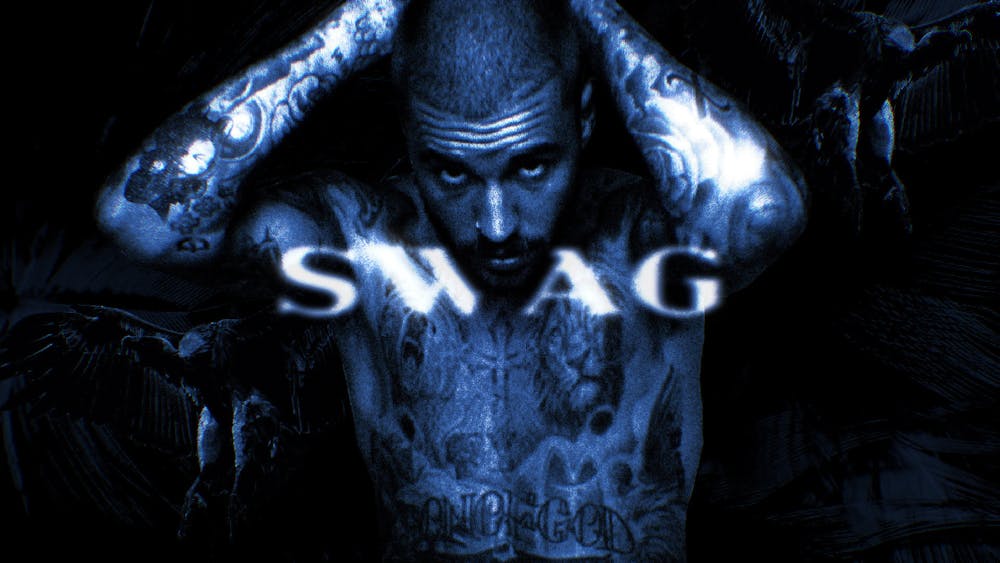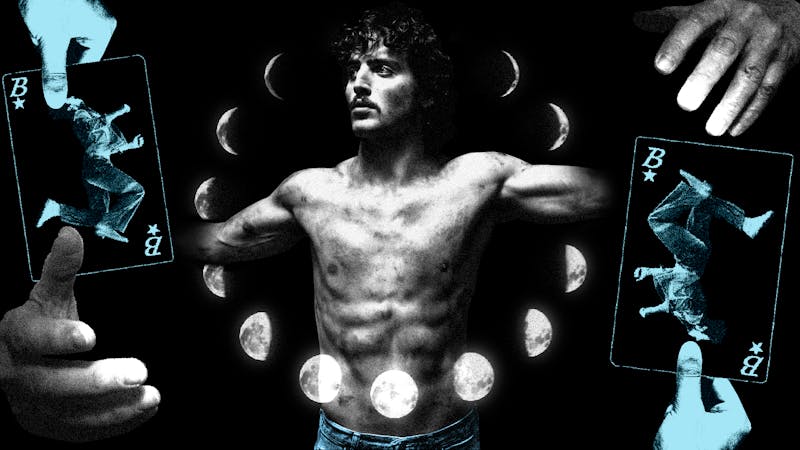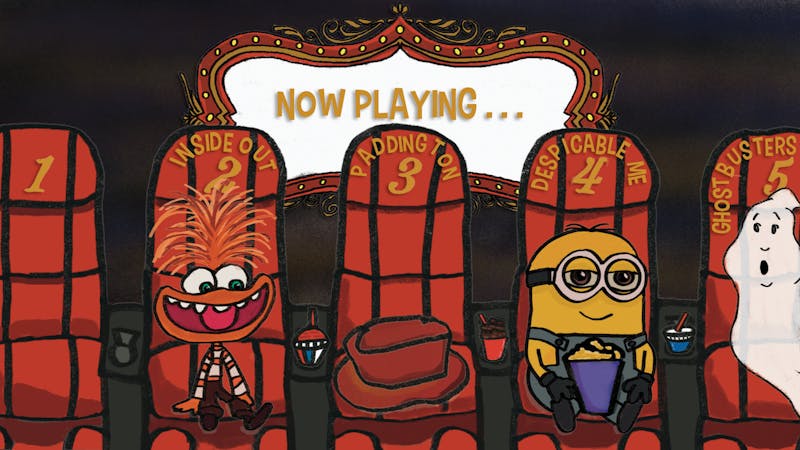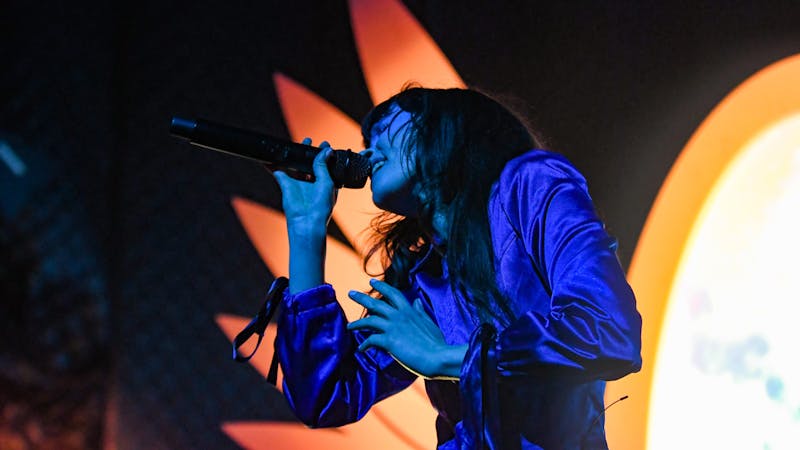In the now–dusty relic of 2010s pop–R&B, “Boyfriend,” Justin Bieber whispered threats of “swag, swag, swag on you,” hauling the term from the fame of 2000s rap stars to a new audience of white kids all over the nation. Not surprising, if you knew his affinity for Lil B, the West Coast rapper most associated with “swag” at the time. Thirteen years later, Bieber’s back on the same wave with his seventh album, SWAG, and the jury’s out: does it really live up to its title?
For several reasons, my hopes for the album weren’t high. There’s the career angle: 2020’s Changes was Bieber’s first hand at “mature R&B,” and it was quickly regarded as his most embarrassing phase to date. Justice was an earnest return to form, but its pop tunes fell mostly flat besides the smoother hit of “Peaches” with Daniel Caesar and GIVEON. Then, there’s the social media front: a clip of Bieber confronting paparazzi with “It’s not clocking to you that I’m standing on business”—a wildly mangled implementation of African American Vernacular English—hit the TikTok think piece economy like a truck last month.
So what are we left with? Just a quirked–up white boy with a little bit of swag, whose best output is R&B collaborations with better artists? Not exactly—and if you’re tapped in, you’d know there was valid hype for this record. Bieber’s always been for the hip–hop crowd, but in the vast eon since Justice, he’s been weirdly in tune with the underground: hopping on a remix of Rob49’s “WTHELLY,” regularly co–signing undergrounders like Drakeo the Ruler, linking up with Opium stars, and dropping minimalist trap snippets on Instagram Live (not at all helping with the worries of hilariously over–concerned fans). Plus, he’s been hanging with Mk.gee, who’s acoustic production on Two Star & the Dream Police was some of the most forward–thinking stuff of the last five years, and, of course, getting in the studio with Lil B. Basically, he’s got great taste.
Which now brings us to SWAG, whose feature list is so rap–heavy you’d think Bieber finally took the plunge after dipping in with “I Feel Funny” and “Honest.” What we get isn’t so much of a 180, but an evolution is quickly apparent: fully denouncing Top 40 pop trappings, SWAG is deeply intimate, with vocals couched in hazy reverb and ‘80s synth pads—in other words, it’s Bieber’s first full–bodied, bona fide R&B effort.
It’s so far, so good for the first leg of SWAG. “ALL I CAN TAKE” sets the tone with Bieber in his Michael Jackson bag, sensually crooning over dreamy leads and punchy percussion. The sickeningly romantic “DAISIES” then fully bares the bluesy, spacious guitar production of Mk.gee to fantastic results. “YUKON” is more earwormy melodic genius, though the chipmunked vocals were a baffling choice—its covers are already outdoing it.
The rest of SWAG rarely reaches the heights of its killer opening, but glimmers of brilliance abound: “WALKING AWAY” is a smoldering midtempo love song that lands among the best of Bieber’s career, and the slower cut “DEVOTION” with Dijon (and a Daniel Caesar co–write) sounds exactly like something that could’ve landed on 2021’s Absolutely, awash in country–soul acoustics and syrupy deliveries (“I like it when you rock me sh–teady”).
But in the buzzkill of the century, we get the Druski interludes. The comedian gets three appearances on the album: the first, “SOULFUL,” has him reassuring Bieber, “You kinda sound black on this motherfucker, man … Your skin white, but your soul black.” On the next, “I’ma be your counselor … you start smokin’ these Black & Milds with me, bro, you gon’ feel way better.” And the last? A coaching sesh on how to sound more natural saying “bih’ness.” It’s not hard to see a pattern there—you could shrug it off as a joke, but Bieber’s “weirdly in tune” racial complex isn’t exactly discreet here. And on an album of such sincere genre ambition, it’s more than a little off–putting to hear him shoved into a supporting role in these skits: a sheepish, insecure voice craving for black validation.
It isn’t just this timidity that spoils the rest of SWAG, though—the album’s also drowning in missed potential and obvious padding. “DADZ LOVE,” while appreciable in Lil B’s unabashed peace–and–love proselytizing, still reads like a half–assed interlude whose breakbeat atmospherics aren’t nearly enough to carry its runtime. “SWEET SPOT”’s hook is groovy as hell, but Sexyy Red’s inclusion is, wildly enough, the most dispassionate she’s ever sounded. And I couldn’t care less about “GLORY VOICE MEMO,” a demo offering whose dusty, lo–fi disposition ironically makes for the most impersonal stuff on the record.
Then, the final tracks are, frankly, awful, without so much as a note of clarity to hold onto, much less remember. “405” and “TOO LONG” are cloying, spaced–out fillers that last an eternity, and it’s shocking that the noodling of “ZUMA HOUSE” isn’t also tagged as a voice memo. Collaborators Cash Cobain and Eddie Benjamin are innocent in this, but “SWAG” is oppressive with its whirlpool of unintelligible reverb—it’s OK to play with song structure, but everything past the first 30 seconds is a sweaty amalgam of R&B scraps shoved in a blender. It’s a shame, because from everything we’ve heard so far, Bieber on a real horndog sexy drill cut would’ve banged.
SWAG is, ultimately, a complicated affair, the freak concoction you get when mixing true sincerity with half–baked ideas, padding for extra streams, and a winking dose of racial psychosis. The inspirations are impressive, but for too long, the album oozes insecurity: why not flesh out those iPhone recordings? Why not write more verses instead of looping a flimsy vibe for minutes on end? Why turn your genre–tourist impostor syndrome into an awkward gag? The pioneering R&B that Bieber borrows the most from is thick, sultry, begging in the rain for a sniff of romance—and while we get hints of that on SWAG, its presentation is more markedly sour, tepid, and, as much as I hate to say it, swagless.






